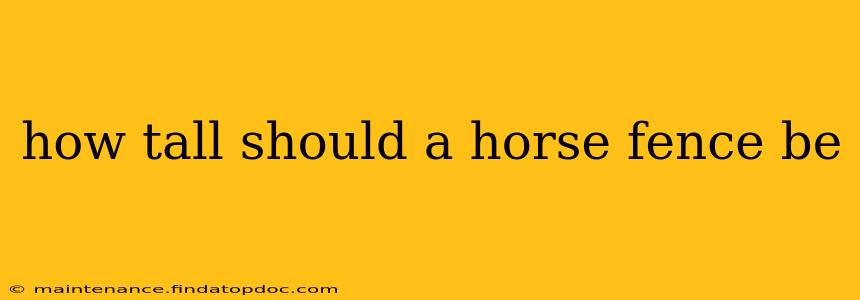Keeping horses safely contained requires a well-designed and appropriately sized fence. The height of your horse fence is a crucial element, and choosing the right height depends on several factors. A fence that's too low presents a serious escape risk, while one that's unnecessarily high can be expensive and potentially dangerous for both horse and handler. Let's delve into the ideal height and other important considerations.
What is the Minimum Height for a Horse Fence?
The generally accepted minimum height for a horse fence is 4-5 feet (1.2-1.5 meters). However, this is just a starting point. Many factors influence the necessary height, and a taller fence is almost always preferable for safety and security. A shorter fence might suffice for a small, docile pony in a secure pasture, but it's rarely sufficient for the average horse, especially if it's energetic or prone to jumping.
What Factors Influence Horse Fence Height?
Several factors play a critical role in determining the appropriate height for your horse fence:
- Breed and Size of Horse: Larger breeds naturally require taller fences. A tall draft horse will easily clear a fence that would adequately contain a smaller pony.
- Temperament and Jumping Ability: Some horses are natural jumpers, while others are more docile. An athletic horse with a history of jumping requires a significantly taller fence. Even a relatively calm horse might jump if spooked or in pursuit of another horse.
- Terrain and Surroundings: Slopes can affect the effective height of a fence. On a slope, a horse might use the incline to gain leverage and jump over a fence that appears tall from a level perspective. Dense vegetation near the fence can also provide horses with a foothold to assist their jumping efforts.
- Type of Fencing Material: The type of fencing also influences the height. A strong, rigid fence made of wood or pipe is more effective at preventing jumps than a flexible wire fence.
How High Should a Fence Be for a Horse That Jumps?
For horses known to jump, or in areas with escape-prone horses, the recommended height increases substantially. Aim for at least 5-6 feet (1.5-1.8 meters), and consider going even higher if necessary. This might necessitate using additional deterrents, such as electric wire or a strong top rail, to discourage jumping.
What About Electric Fencing for Horses?
Electric fencing can be a very effective addition, regardless of the height of the fence. It acts as a deterrent, not a containment solution on its own. A well-installed electric fence, combined with a high physical barrier, significantly reduces the risk of escapes.
What is the Best Type of Fence for Horses?
Several types of fencing are suitable for horses, each with its pros and cons:
- Wooden Post and Rail: A classic and effective choice, offering good visibility and durability.
- Wire Fencing: More affordable but requires tighter spacing and often necessitates electric wire for additional deterrence.
- Pipe Fencing: Strong, durable, and long-lasting, though often more expensive.
- Vinyl Fencing: Low-maintenance but can be more expensive than other options.
Ultimately, the best type of fencing depends on your budget, preferences, and the specific needs of your horses.
How Often Should I Inspect My Horse Fence?
Regular fence inspections are crucial for safety. Look for any damage, sagging, or loose wires. Repair or replace any damaged sections promptly. Ideally, conduct thorough inspections at least once a week, more frequently during severe weather.
By considering all these factors and regularly maintaining your fencing, you can significantly reduce the risk of your horses escaping and ensure their safety and well-being. Remember, safety is paramount when it comes to horse fencing. If you have any concerns about the suitability of your fence, consult with an experienced equine fencing professional.
